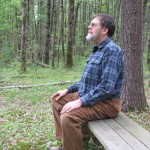It is truly amazing how little I can remember the feeling of this exhaustion when I am not teaching… that I can’t anticipate how little of me there is at the end of a day or week in the classroom.
I keep thinking I’ll be able to do things: visit a friend, write a blog post, read a serious book… and I keep being surprised when, as happened again this past weekend, Saturday rolls around and I just fall down.
Sorry. This isn’t meant to be a teaching blog. But teaching is looming so large in my poor little psyche these days that there’s little room for anything else.
But however firm the wall between church and state within my little classroom, religion follows me wherever I go, and my experiences as a teacher and as a soul are definitely affecting one another.
For one thing, there are the conversations with S.
I’m mentoring a Fulbright exchange teacher from India, as I mentioned earlier. It’s a terrific experience overall–though where he comes up with his energy, I have no notion! We are fortunate in that, unlike most mentors and mentees (is that even a word?) we have enough time together–we both live in the same small city, and commute together to our small regional high school. A half hour in the car each morning and evening is dedicated to talking about whatever small or large cultural or educational questions might be coming up for him… everything from how to weight quizzes to the role of special education in American Schools. He’s an extraordinary, curious, adventurous spirit, and I’m enjoying the connection a lot.
It also is an experience that I find challenging in a few unexpected ways. S. is, you see, not a Hindu, as might be guessed, nor even a Muslim, but rather a serious and dedicated Indian Christian. And among our cultural conversations have been a few on the subject of religion. He has been a bit surprised to find that the U.S. is not a Christian nation, for instance. And though he is pretty open minded when it comes to religious pluralism in this country, there are a few concepts that awkwardly enough, don’t translate.
He’d never heard of Quakers. That I explained at least roughly, in terms that made at least intellectual sense… though giving the thumbnail sketch of Quaker history to someone who had never heard of a Puritan took some thought.
The whole question of Christian and non-Christian Quakers, which feels so central to my integrity if I discuss my religion, is almost impossible.
S. has never heard of “Wicca” or “Paganism”–at least in the sense of a modern religious movement. I might as well say the words “Froodle” or “Pipkin” to explain my personal spiritual life. He doesn’t have any of the same cultural stereotypes, either–one teacher, who knows I’m Wiccan, made a joke in front of him about whether or not we share a broom for the rides to and from school rather than a car. The witch riding on broomstick motif is just not a part of his cultural background. I had to translate the joke later, and there’s no doubt in my mind he had no idea why Jeff thought he was being funny, or what either brooms or witches have to do with anything about me.
Where to begin? Well, not with the stereotypes, thanks! Since I’m not a broom-flyer, it doesn’t seem appropriate.
Well, but if I feel the need to clarify my position in our discussions, why not speak in terms of the polytheism of the Hindu world, with which S. is familiar?
See, he’s familiar, but not in a nice, comfy, P.C. North American way. To S., Hindus are the benighted and superstitious majority he needs–through his church, at least, if not personally–to evangelize to. He has made it very clear that Hinduism is, to his mind, simply a mountain of foolish superstition that will vanish like magic when people are exposed to the infinitely superior Gospels.
Now, S. is a gentleman and a kind man. I’m not in the least afraid of becoming the target for any bigotry or intolerance. But I’m his host, his mentor… and I really don’t want to make him embarrassed. I do want to let him know that, well, some of us polytheistic heathen types receive a fair amount of comfort and strength from our gods–whom we do not consider to be superstitions any more than he does Jesus, thanks very much. But how can I speak for Hindus, when all of my experience is book learning from half a world away? And how can I set him straight without causing him mortifying embarrassment?
Laugh if you like, but I have not yet found a way to make myself clear, in the small windows of time when religious topics have coincided with an appropriate moment on a drive. (Just pulling into the school parking lot = not an appropriate moment.)
I don’t mind if our world views are very different. But, well, let’s just say that I find “passing” for monotheist, particularly in a context of a relationship where some pretty negative things have been said about polytheists, acutely awkward.
S. was teaching Beowulf last week. Perhaps that accounts for the appearance of Grendel’s mother in the dream I had last Friday.
I was in the midst of a group of some kind of unearthly Others. Fair Folk, Wild Hunt, spirits of some sort… and it was a context that clearly involved–as do contacts with the Good Neighbors–the need to be careful of cultural signals and etiquette that might have unexpected consequences.
I had a guide with me–a young man, of medium height, with dark black hair and fair skin, who was talking me through how to behave in a manner that was at once polite and safe in that company. We had all just arrived at some woodland retreat, a set of buildings clustered in a clearing in the forest. It was the end of the day, and shadows were falling fast.
On a kind of bridge between two buildings, tied up in straps from head to foot, lay the naked figure of… Grendel’s mother–a greater monster even than her monster son, remember. She was alive, but completely inert.
When the company found her, they were enraged, and I could only watch in some horror as her figure was taken up by one of the members of the company, and then beaten against the walls and ground and trunks of trees until it broke apart into hundreds of fragments… Fragments, surprisingly, of a tough and decidedly unappetizing meat.
The company then all gathered around her, and pieces of her flesh were doled out on all sides. My guide told me that I must eat–that to do otherwise would give grave offense.
The giant who had beaten her into morsels grinned at me, holding out a scrap of meat. It looked like undercooked chicken skin, with stringy dark meat and fat clinging to it, and it was disgusting. I understood that Grendel’s mother was the embodiment of human sin and evil, and that I was being offered a kind of communion with that.
I did not want to eat, but it was clear that I must, so I took the scrap of meat.
“You’ll love the taste of it! You’ll see!” leered the giant. And I shook my head, knowing that that at least was not true.
It tasted awful, but I knew that, in tasting it, I was acknowledging that there was nothing that was in Grendel’s mother that was not in me. Not only did the assembled company expect me to take part in this bizarre communion, but it was actually right to do so, for I knew that, loathsome as her substance was to me, it was really not foreign to me at all, and that admitting that was the best protection against one day learning to “love the taste.”
After that, a bonfire was lit somewhere, and music began to play. It was full dark, and I could see stars glittering by the thousands in the blue-black of the sky. There was no moon, but the stars were so bright that the naked boles of the trees in the woods all around were perfectly visible as deeper black silhouettes against the night sky.
I found myself swaying to the music. We were all gathered in a clearing, and the tone was peaceful and celebratory now, not monstrous. I knew that somewhere, at the opposite end of a long line of figures, was the god Odin, and that it was his celebration in some way. I could feel the music swelling in me, and a great sensation of joy and love, and the willingness to do and strive rising up in me. I knew (and I had a vision of antlers rising above Odin’s head as I thought it–Odin being at least one of the figures who has loaned his mythology to my patron, Herne)that I was going to dance, soon… to let to music move me out into the clearing and set me spinning.
I knew, too, that my dancing would bring Odin to me–that my joyful willingness to dare and to love was going to draw him to dance with me. And that I would gaze into his eyes–
“You must never gaze into his eyes!” gasped my guide–
and, in fact, that I would gaze most deeply into his missing eye, the eye he traded for the wisdom of Mimir’s well
the eye that held the deep infinity of space and all those far away, rushing, rushing stars
and I would fall and fall and fall and not mind, ever…
And I woke up just before I would have begun to move, to dance.











